History Prizes 2012
 FIRST EMPIRE PRIZE
FIRST EMPIRE PRIZE
Marie-Pierre REY, L’effroyable tragédie, une nouvelle histoire de la campagne de Russie, Paris, Flammarion
The Russian campaign of 1812 was a terrible episode in European history. Less than twenty percent of the Grand Army returned to France after bloody fighting (45,000 killed on the Russian side and 28,000 deaths in the Grande Armée at the Battle of Borodino alone). Typhus epidemics caused havoc, and a tragic retreat in the heart of winter decimated the once great army. Marie-Pierre Rey is a leading expert in Russian history and the author of a notable biography of Alexander I (Flammarion, 2009), and here she offers a what you could call a “biography” of the Russian campaign, up close and personal with the protagonists, namely the French and Russian officers, soldiers and civilians.
 SECOND EMPIRE PRIZE
SECOND EMPIRE PRIZE
Yves BRULEY, Le quai d’Orsay Impérial, Éditions A. Pedone
Upon his accession, Napoleon III revived the building site on the Quai d’Orsay, finally turning it into the offices of the French Foreign Ministry in the summer of 1853. Whilst the second emperor’s foreign policy has been extensively studied, his diplomacy has been much less followed. This book is the first study of this rich and little-known story. The “Emperor’s secrecy” and the debacle of 1870 have long been seen as proof of the Second Empire’s failed diplomacy. Yves Bruley reverses this historical construction, establishing the true role of the Ministry of Foreign Affairs at a turning point in its history. The reader is placed at the heart of the Quai d’Orsay and observes diplomacy “inside”, namely, how ministers worked with their cabinets and administration, how decisions were taken by Napoleon III, and how French diplomats acted throughout the world. Thousands of unpublished documents – letters, memoirs and others – reveal an unexpected side of the Quai d’Orsay. This was “classic” diplomacy, but one that was rapidly modernizing, with ambassadors sometimes puzzled by the Emperor (but party to his success) and with diplomats on a mission to establish the “moral authority” of France, a momentum which was to be stopped dead by the war of 1870.
 HISTORY AND MUSIC PRIZE
HISTORY AND MUSIC PRIZE
Daniel PROPPER et Olivier FEIGNIER, L’écho des batailles, Label Forgotten Records
Piano music from the 1800s to 1815 has not attracted the attention its diversity rightfully deserves. This period is obviously more renowned for the battles that pitted Royalist against Republican and Republican against Imperialist, than for the flourishing musical life that accompanied it. And yet the fifteen years at the beginning of the century marked a period when composers started to hear a new harmonic language. This was a time when the emergence of national consciousness promoted the use of instantly recognisable national airs and popular themes so as to characterize the antagonists in the ‘battles’ which raged in piano salons. Finally, it was an epoch which began to see the rise of “bravura variations” with which virtuoso pianists packed their soirées. The recording here reveals this diversity, still largely unknown. The disk comprises pieces carefully selected from amongst many works which have fallen into obscurity, and it must be listened to with the following thought in mind, namely, that the composers did not know that in fact they were heralding the music of the modern era.
